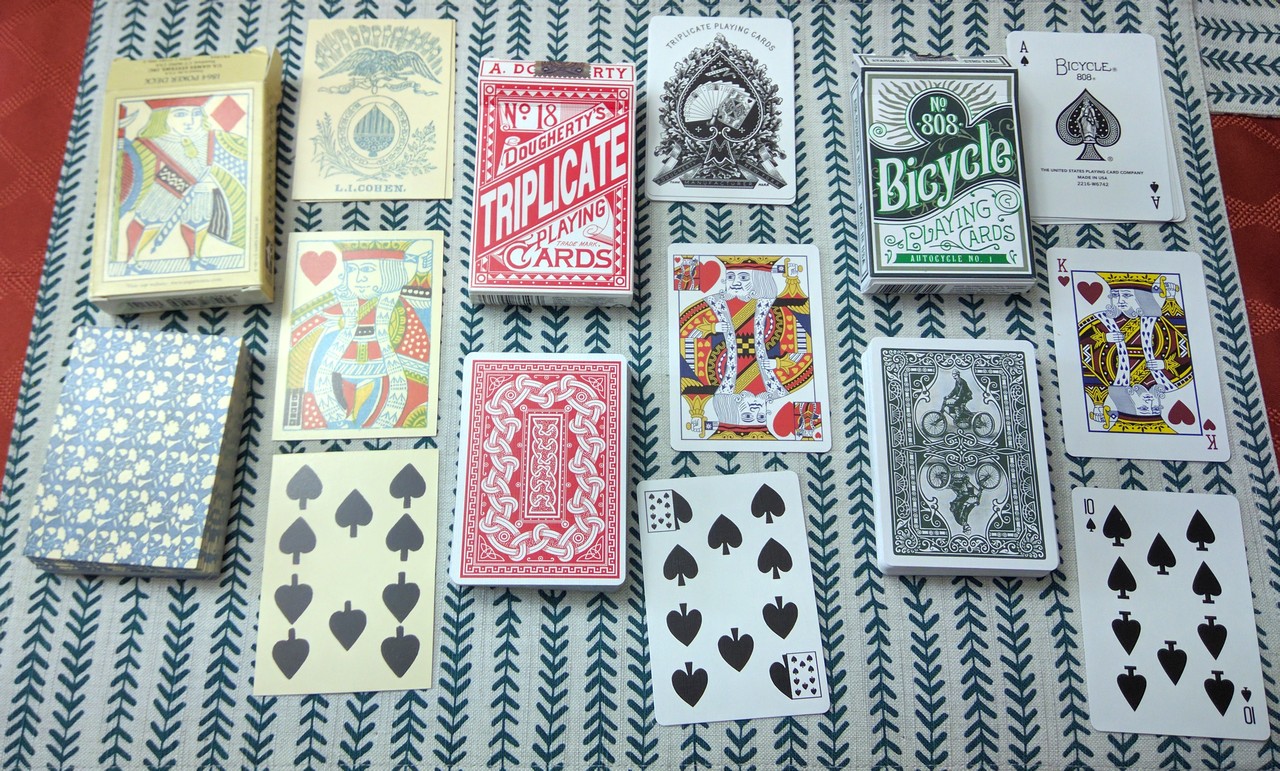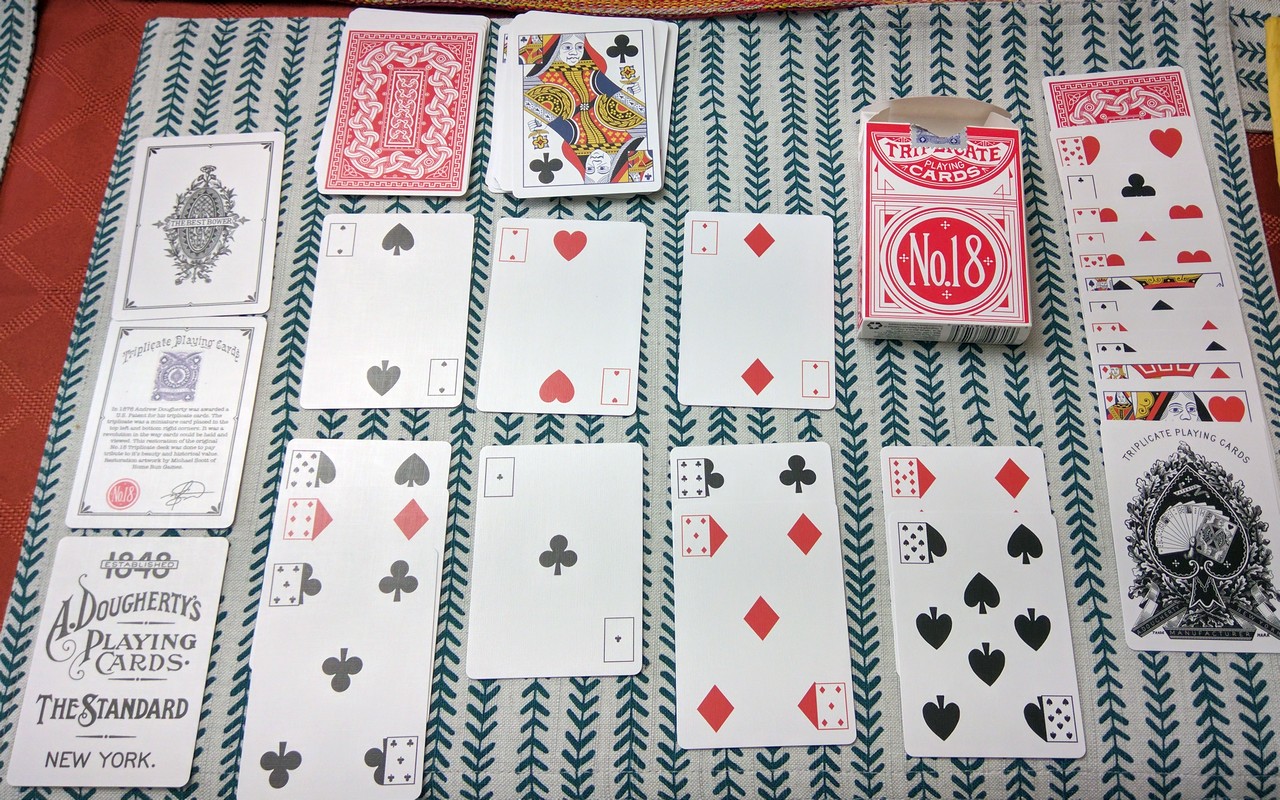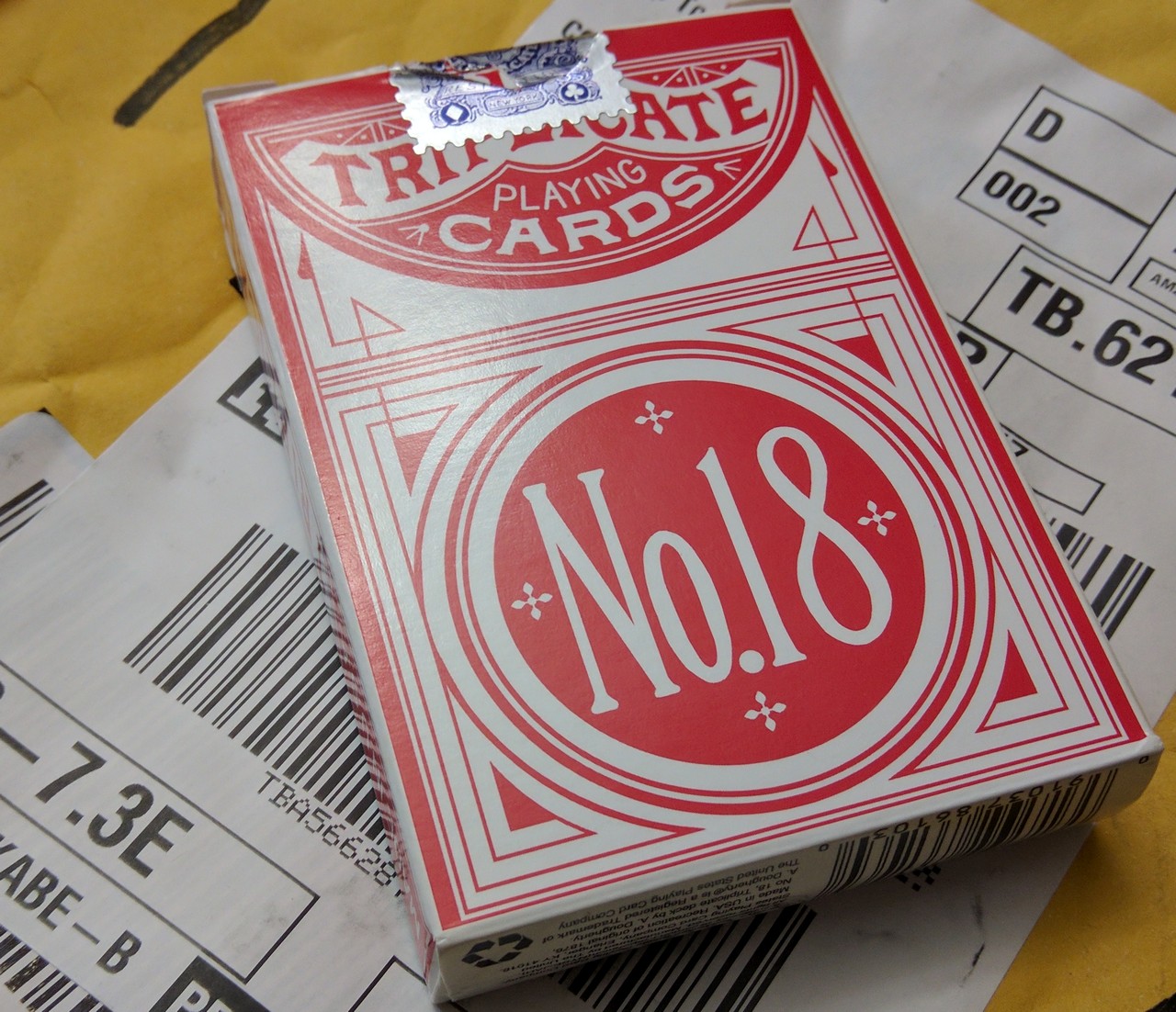
It's been long enough since my last post here that things are getting a bit, uh, strange.
I can't just start a post with a zinger like that and not explain things, but have some patience with me, because I feel like I should explain the item itself before I explain the circumstances in which I got it.
This month's model is called A. Dougherty Triplicate No.18, and according to its information card, it is a 2014 reproduction of an 1876 deck designed and patented by Andrew Dougherty. It differs from a typical deck of cards in that, instead of displaying a normal rank and suit indicator in each corner, there is a miniature copy of the card's face. There are two such miniatures which, combined with the actual card's face, make a total of three - hence the name, "Triplicate." As far as the patent, I did find a patent filed in 1876 by Andrew Dougherty, but it does not definitively resemble these cards - on the other hand, it leads me to hypothesize if Mr. Dougherty invented the corner rank indicator by way of the Triplicates.

From left to right: US Games Systems' 1864 Poker Deck, the 1876 A. Dougherty Triplicate, and the 1901 Bicycle Autocycle No.1 (all are modern reproductions). Note lack of rank indicators on the 1864 deck, and modern-style ranks on the Bicycles.
The 2014 Triplicate deck, then, bears the Dougherty name (and identical back design), but is manufactured by the United States Playing Card Company, meaning these cards come with all the usual comforts of USPCC decks, down to the air cushion finish for which they are famous. The restoration effort is credited to artist Michael Scott of Home Run Games, notable for contributing a high amount of stylish card designs - not just of French decks, but also of purpose-built dedicated card games like 8-Bit Mafia, Ultimate Soldier, and restorations of other historical decks. This particular restoration was successfully backed via Kickstarter back in February of 2014, along with a handful of others, like Tally-Ho.

Canfield continues to be my game of choice for a quick photo-op.
These Triplicates continue to retail on sites like Amazon for $15 - slightly more expensive than most of the nicer Bicycle brand decks, also manufactured by the USPCC. Whether they're worth the money, I can't rightly say; the effort put into restoring and reproducing such a historically important deck design (down to the packaging) must have been quite an undertaking, considering how hard an original deck would be to find in decent condition, let alone the process of recreating it. Playing games with these cards is a bit different than with a traditional deck as well; while fanning is still possible (thanks to the miniature triplicate design), without an easy-to-read number, I found I was doing a bit more counting than normal. I'd also hope that you're able to distinguish between Jacks and Kings - while they're certainly the same sort of traditional designs a card player would be used to, I find that they're not quite different enough to be able to tell them at a quick glance. That said, if I were asked to pay the 15 bucks to purchase this deck - or even make this deck happen, as it was on Kickstarter, after all - I would certainly consider it. As for why I can't say if it's worth the fifteen dollars, well, in full disclosure, I received this deck for free. And I'll explain that in a moment.

It appeared, one day, upon my doorstep...
On the morning of November 27th, 2017, I'd just finished sending the kids off to school when I noticed a bubble mailer on my porch. I didn't quite understand it; I had recalled purchasing some decks of cards from eBay the week before, but the mailer was addressed from Amazon Fulfillment Services. Its contents were exactly one (sealed) deck of playing cards, the Dougherty Triplicates. No packing slips, no gift receipts, not a single clue of who might have ordered it. But on the envelope was my name and mailing address.
I reasoned that it might have been a gift, but if it were to wait for Christmas, it would not have been addressed to me, but perhaps to my mother or father, who would have immediately hidden it and wrapped it as a stocking stuffer for next month. I inquired among my friends and family to see if anybody had any memory of buying me the deck - nobody had. I took to Google, asking "Why did I get an Amazon package I didn't order?" A number of people claimed that this could be a scam, that it's a way to con you into accidentally returning an item to the wrong place, or including your credit card details. No, that couldn't be it. My accounts were all secure, nothing suspicious in the bank statements, and nobody else had so much as tried to enter a password into my Amazon and Google accounts. So at the very least, I could be confident that this was not a scam.
Mom got back to me later that day, saying that she'd found an Amazon review of this exact deck of cards:

"They were a gift no clue but will let you know what tey think"
In Mom's theory, this person might have also received the cards anonymously - on further analysis, I wonder if this reviewer bought the cards for someone else. Hard to say. But the idea that someone might have bucked out the 15 dollars for me, out of the goodness of their heart? No, nobody does things like that for free. They probably wanted something from me. A blog post, perhaps? After ten thousand years three months of silence? Well, here you go, anonymous giftster, with my compliments. This unexpected gift is most appreciated, and has led me to read up on old playing cards again after months of being stuck in a haze of pseudo-depressiveness. I have no idea who you are, but if I have the chance, I will find you, and I will thank you.